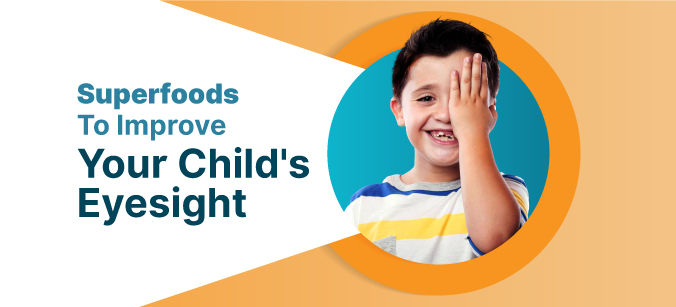General Health
5 Superfoods to Improve a Child’s Eyesight
5 min read
By Apollo 24|7, Published on - 17 October 2022, Updated on - 07 August 2024
Share this article
0
0 like

One in every three children in India wears glasses. This poor vision is primarily because of three things- inadequate nutrition, a surge in screen dependency, and the ever-growing mental stress.
Read on as this blog discusses some superfoods you can instil in your child’s diet to steer clear of this rampant vision loss and help improve your child’s eyesight-

Carrots | Vitamin A
Carrots are one of the richest sources of beta carotene- an antioxidant carotenoid that your body converts to vitamin A.
This ‘vitamin A’ is easily one of the most fended nutrients for your eyes. It not only helps you see clearer, but also colourful! It especially enhances your ability to see in low light, improves eye colour balance, and keeps them well lubricated to avoid any infection. It is also known to fight free radicals, thus reducing your risk of muscular degeneration, cataract or glaucoma.
Additional Pros: From salads, juices, paratha, and curries, to the yummiest of desserts, carrots are easily blended to taste. Moreover, they are one of the cheapest, most local, and super accessible superfoods in the Indian market.
Alternatives: All colourful fruits and veggies like sweet potatoes and cantaloupes as well as dark leafy greens like kale and broccoli.
Oranges | Vitamin C
Vitamin C is definitely the vitamin ‘See’. This is because it protects your eyes against the vital damage from UV light, oxidation, and free radicals that may otherwise cause cataracts and macular degeneration. Oranges, a rich source of vitamin C are also known to build collagen, the element that provides the structure for your cornea. Thereby, it is only apt to say, oranges make your vision clear, your eyes less blurry and your cornea stronger against all age-related disorders.
Additional Pros: Oranges are cheap, local, handy and mess-free. Simply pick, peel and eat! (Save the peels and you will have an excellent face mask and room freshener handy!)
Alternatives: All citrus fruits such as strawberries, kiwi, red bell pepper, cantaloupe and broccoli.
Salmon | Omega 3
Be it the chilly winds of winter, or long hours of cricket in the Sun, your eyes get dry. And Omega 3 is your one-stop solution to those dry, red, and inflamed eyes.
This is why having raawas- the Indian salmon fish at least twice a week, helps maintain beautiful moisture in the eyes that makes them shine and feel rested. It also clears off debris and avoids related infections.
Added Pros: Raawas is local, accessible and delectable to the Indian palate! It not only improves your eyesight but also makes your skin firm, bright and supple! Also, it's particularly noted for a healthy metabolism that helps promote weight loss!
Alternatives: Any oil-rich fish, flax seeds, walnuts, and soybean.
Eggs | Vitamin A, Lutein, Zeaxanthin, and Zinc
Egg yolks are loaded with antioxidants such as lutein and zeaxanthin. Together, they help protect the eyes against muscular degeneration, age-related vision loss, and cataracts. And while the zinc in the egg yolk helps you see in the dark, it's vitamin A helps you see brighter and more colourful.
What's particularly special about eggs is that their high-fat content helps you easily absorb all this anti-oxidant goodness!
Added Bonus: Eggs are cheap, versatile and super easy to make! Get an omelette for breakfast, or a hard-boiled egg as an evening snack, and you know you have eaten yummy and healthy!
Alternatives: Green leafy vegetables.
Almonds | Vitamin E
Almonds are a great source of vitamin E, an antioxidant that helps guard against unstable molecules and free radicle damage.
Consuming them regularly thus helps protect against infections, cataracts, age-related vision loss, and muscular degeneration!
Added Bonus: Almonds are the easiest and most readily available snack! Just soak a few overnight and have them with mishri or kishmish the next morning- an important Indian tradition that must pass on!
Alternatives: All nuts and seeds, especially sunflower seeds, hazelnuts, and peanuts.
Important: In addition to the right diet, it is equally important that your child has a restful and balanced lifestyle. We recommend you reduce a little on the screen time, and whenever required, balance it with the “20-20 rule.” That is, every time when you or your child looks at the screen for 20 minutes, break that time by giving your eyes rest of at least 20 seconds. Also, do not forget your child's regular doctor consultations! Any repeated experience of headache, or dry and inflamed eyes is a red flag. In such a case, doctor consultation must be sought immediately.
To know more about best foods that help improve your child eye sight, click the below button and have a consultation with any of our best Dietitians & Nutritionists.
Best Dietitians & Nutritionists
Frequently Asked Questions [FAQs]
1. What can I drink to improve my eyesight?
Some of the best drinks for improving your eyesight include:
- Lemon water
- Orange juice
- Carrot juice
- Spinach/kale juice
2. What is good for children's eyes?
In addition to the above-mentioned foods in your children’s everyday diet, you can also feed them food rich in certain nutrients like zinc, omega-3 fatty acids, lutein, and vitamins A, C and E.
3. Which fruits and vegetables improve eyesight?
Fruits such as red berries, kiwis and tomatoes are good for the eyes. Juices of fruits like guava, orange, etc. can also be good for a child’s eyesight.
4. Are eggs good for the eyes?
Yes, eggs are good for the eyes. They contain various bioactive components like beta carotene, vitamin A, lutein and zeaxanthin which might be beneficial for eyes.
5. Can we take vitamin A supplements for better eyesight?
Yes, when the food you eat doesn’t supply adequate nutrients, you can opt for supplements. However, take vitamin supplements after consulting a doctor.
Best Eye Specialists For You & Your Child
Medically reviewed by Dr. Dhanunjay Reddy
General Health
Consult Top Paediatricians
View AllLeave Comment
Recommended for you
%20(2).jpg?tr=q-80)
General Health
Thyroid Normal Value in Female: Common Symptoms of Abnormal Thyroid Levels
Learn about thyroid normal values in females, common symptoms of thyroid disorders, and essential tests for diagnosis. Stay informed for better thyroid health.

General Health
Tomato Flu: What It Is And How To Stay Safe From It?
Tomato flu is a new and rare viral infection that is primarily seen in children below the age of nine. Being aware of its symptoms and precautionary measures is the best way of keeping this illness away.

General Health
The Role of Zinc in Promoting Better Health
Zinc is an essential nutrient that supports growth during childhood and maintains the functioning of the immune system.
Subscribe
Sign up for our free Health Library Daily Newsletter
Get doctor-approved health tips, news, and more.
Visual Stories

Science-backed Home Remedies for Burns and Blisters
Tap to continue exploring
Recommended for you
%20(2).jpg?tr=q-80)
General Health
Thyroid Normal Value in Female: Common Symptoms of Abnormal Thyroid Levels
Learn about thyroid normal values in females, common symptoms of thyroid disorders, and essential tests for diagnosis. Stay informed for better thyroid health.

General Health
Tomato Flu: What It Is And How To Stay Safe From It?
Tomato flu is a new and rare viral infection that is primarily seen in children below the age of nine. Being aware of its symptoms and precautionary measures is the best way of keeping this illness away.

General Health
The Role of Zinc in Promoting Better Health
Zinc is an essential nutrient that supports growth during childhood and maintains the functioning of the immune system.

